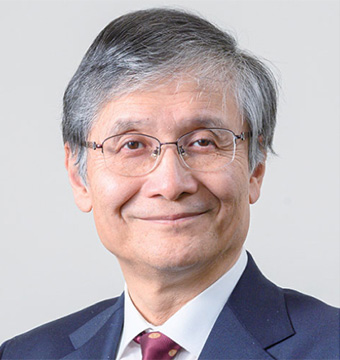 Dr. Yasuura graduated from the Department of Information Science, Faculty of Engineering, Kyoto University in March 1976, completed a Master's degree in Information Science from the Graduate School of Engineering, Kyoto University in 1978, became a research associate in April 1980 and an associate professor in 1986 in the Faculty of Engineering, Kyoto University. After that, from 1991, he served as a professor of the Interdisciplinary Graduate School of Engineering Sciences, Kyushu University, and from 1996 to 2019 as a professor of the Graduate School of Information Science and Electrical Engineering (Currently Faculty/Graduate School), Kyushu University. Since 2008, he has been Executive Vice President of Kyushu University.
Dr. Yasuura graduated from the Department of Information Science, Faculty of Engineering, Kyoto University in March 1976, completed a Master's degree in Information Science from the Graduate School of Engineering, Kyoto University in 1978, became a research associate in April 1980 and an associate professor in 1986 in the Faculty of Engineering, Kyoto University. After that, from 1991, he served as a professor of the Interdisciplinary Graduate School of Engineering Sciences, Kyushu University, and from 1996 to 2019 as a professor of the Graduate School of Information Science and Electrical Engineering (Currently Faculty/Graduate School), Kyushu University. Since 2008, he has been Executive Vice President of Kyushu University.He has long been involved in building VLSI technology that supports energy-saving computing and dependable computing. In modern semiconductor systems, DVFS (Dynamic Voltage and Frequency Scaling) is one of the most efficient approaches to realize low power consumption, and he has theoretically elucidated and modeled it, and has also designed computer systems using this technology. These basic technologies have been put to practical use in many modern computers, and the papers authored by him have more than 900 citations, and are recognized worldwide as high impact papers. He also devised a new method to improve the efficiency of testing semiconductor chips and established security technology using RFID. In the utilization of computer systems and the spread of ICT applications, improving reliability and safety is extremely important. In addition to theoretical research, he developed social demonstration experiments in the real world, developed technology that can be truly used in society, and systematized and generalized it. This is an extremely significant achievement in building a social information infrastructure. Furthermore, he devised a new computer system design method called Hardware/Software Co-design, and demonstrated its effectiveness. In the current situation where the end of semiconductor miniaturization is imminent, the need for co-design of Hardware/Software is shown in various fields. He has been proposing this concept since the late 1990s and had a major impact on modern computer design methods.
In addition to this, he In addition to this, he has also developed a construction theory of new social systems based on information technology, and has been focusing on various social implementations that introduced new information technology, such as IC card student/staff ID using original technology, various campus services based on this, and 2 the construction of educational support systems based on a university-wide BYOD (Bring Your Own Device). As the first chairperson of the Academic eXchange for Information Environment and Strategy (AXIES), he played a central role in establishing the council and promoted the sophistication of education, research, and management using ICT at higher education and academic research institutions across the country. In addition, as a JST PRESTO Research Supervisor, he is also committed to fostering young researchers in the field of information science, and is also in charge of the senior director of the intellectual cluster creation project/the Fukuoka base of the Ministry of Education, Culture, Sports, Science and Technology (developing the "Silicon Sea Belt Fukuoka Project"), a principal of Fukuoka Institute of System LSI College, etc., and has greatly contributed to regional development and human resource development.
For the above achievements, For the above achievements, he has been awarded the title of Fellow by the IEICE, the IPSJ, and the IEEE, and has received numerous awards, such as the IEICEfs Achievement Award and Commendation for Industry-Academia-Government Collaboration by Minister of Education, Culture, Sports, Science and Technology. He also serves as the Vice Chairman of the IEICE, a member of the Science Council of Japan, a member of the Information Science and Technology Committee of the Ministry of Education, Culture, Sports, Science and Technology, and contributes greatly to the promotion of the information technology field. As mentioned above, we are convinced that his contribution to the IEICE and the field of electronic information and communication engineering is extremely remarkable, and that he is worthy of receiving the IEICEfs Distinguished Achievement and Contributions Award.